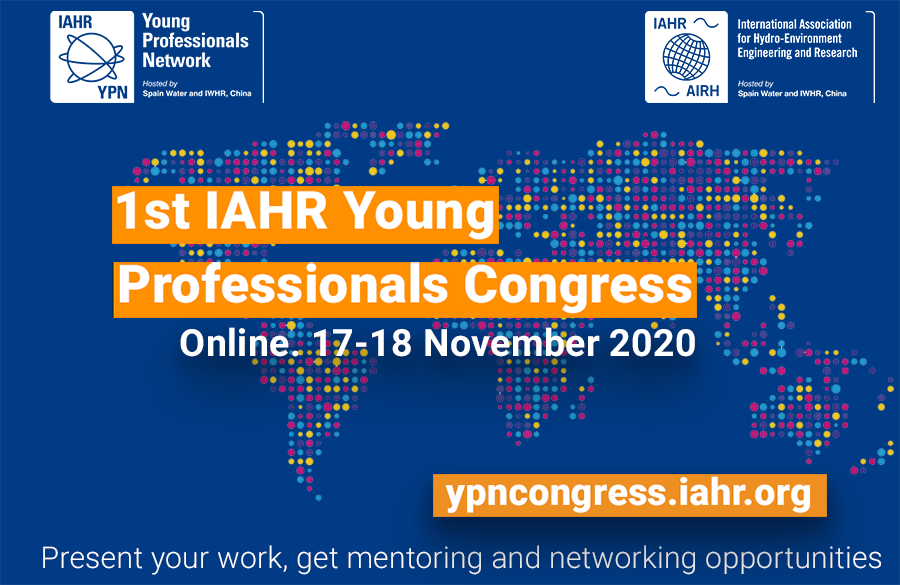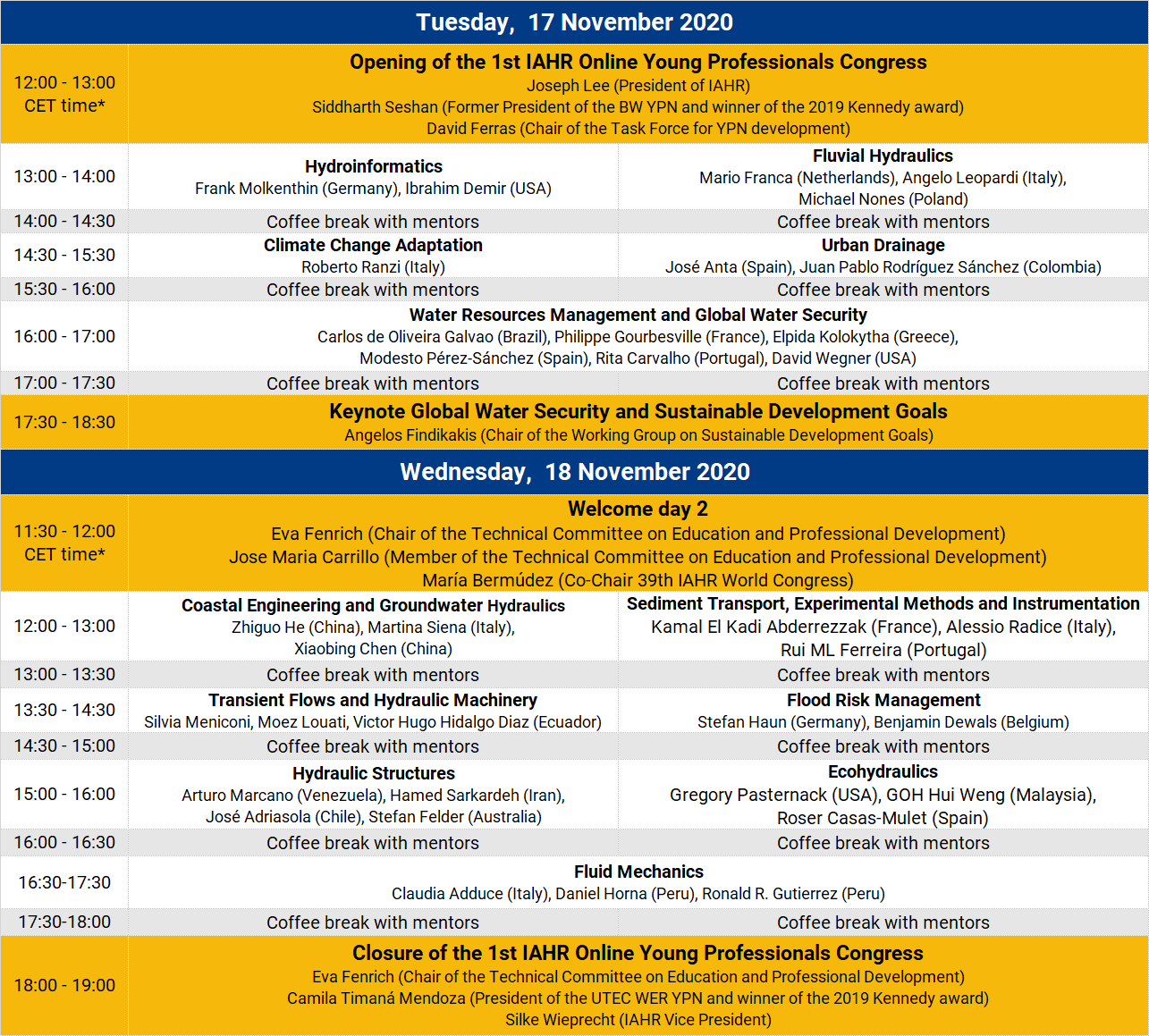1st IAHR Young Professionals Congress

Presentations & Mentoring
Present your work, get mentoring and network with other young professionals and experts in your field around the world!
17-18 November 2020. Online
The IAHR technical committee on Education and Professional Development is organizing the first virtual congress for young professionals. The aim is to give you the opportunity to present your work and get feedback from mentors.
The congress is a wonderful opportunity to present your work and get mentoring from leading experts.
It represents a unique opportunity for networking as well; you will be invited to meet and interact with your peers and mentors through breakout sessions.
This is also the chance to make your work known; all the proceedings will be published and made available in the IAHR e-library after the congress.
Young professionals will present their work by submitting an extended 2-page abstract for review by the International Scientific Committee. Once accepted, your abstract will be assigned to one of the sessions chaired by the IAHR technical committees, and on the date of the event it will need to be supported by a one-page poster and a 3- to 5-minute presentation. Young professionals will receive feedback from mentors on their work and will be invited to join the break sessions so they can meet with their peers as well as the leaders of the IAHR technical committees.
Opportunities and benefits
Connect with other YPNs worldwide and by areas of expertise.
Mentoring.
An opportunity to meet with representatives of the IAHR technical committees.
The Congress is open to students but also to young professionals.
Free registration.
Open to all: IAHR young professionals members and non-members.
Proceedings will be published and made available in the IAHR e-library after the Congress.
Selected works will be invited to publish a paper in a special issue of the Journal of Applied Water Engineering and Research
*Time in different zones
The 1st IAHR Young Professionals Congress will start on Tuesday 17 November 2020 at:
06:00 (EST-Eastern Standard Time) 11:00 (UTC-Universal Time Coordinated) 12:00 (CET-Central European Time) 19:00 (CST-China Standard Time)
Detailed programme:
Plenary session livestream Room 1 livestream Room 2 livestream
Follow the livestream on YouTube

Hydraulics
Fluid Mechanics
Experimental Methods and Instrumentation
Fluvial Hydraulics
Hydraulic Machinery and Systems
Hydraulic Structures
Hydro-environment
Climate Change Adaptation
Ecohydraulics
Coastal & Maritime Hydraulics
Flood Risk Management
Groundwater Hydraulics and Management
Hydroinformatics
Urban Drainage
Water Resources Management
Innovation and Professional Development
Education and Professional Development
Higher Education and E-learning
Working groups
Global Water Security
Marine Outfall Systems
Reservoir Sedimentation
Sustainable Development Goals
Transient Flows
Organising Committee
Silke Wieprecht, University of Stuttgart, Germany.
Eva Fenrich, University of Stuttgart, Germany.
David Ferras. IHE Delft, The Netherlands.
José M. Carrillo. Universidad Politécnica de Cartagena, Spain.
International Scientific Committee
Alessio Radice. Politecnico di Milano, Italy.
Angelo Leopardi. University of Cassino and Southern Lazio, Italy.
Arturo Marcano, Universidad Católica Andrés Bello, Venezuela.
Asaad Shamseldin. University of Auckland, New Zealand.
Benjamin Dewals. University of Liege. Belgium.
Carlos de Oliveira Galvao. Universidade Federal de Campina Grande. Brazil.
Claudia Adduce. Roma Tre University, Italy.
Daniela Molinari. Politecnico di Milano. Italy
Daniel Horna. Universidad de Ingeniería y Tecnología (UTEC) Peru.
David Ferras. IHE Delft, The Netherlands.
David Wegner. UMCES, USA.
Elpida Kolokytha, Aristotle University of Greece, Greece.
Eva Fenrich. University of Stuttgart, Germany.
Gensheng Zhao. NHRI, China.
GOH Hui Weng. River Engineering and Urban Drainage Research Centre, Malaysia.
Gregory Pasternack. UC Davis, USA.
Hamed Sarkardeh. Hakim Sabzevari University, Iran.
Ibrahim Demir. University of Iowa, USA.
José Adriasola. Bechtel, Chile.
Jose Anta. Universidade da Coruña, Spain.
José M. Carrillo. Universidad Politécnica de Cartagena, Spain.
Juan Pablo Rodríguez Sánchez. Universidad de los Andes, Colombia.
Kamal El Kadi Abderrezzak. EDF, France.
Majid Mohammadian. University of Ottawa, Canada.
Mário J. Franca. IHE Delft, the Netherlands.
Martina Siena. Politecnico di Milano, Italy.
Massimo Guerrero. Università di Bologna, Italy.
Matthew Wood. HR Wallingford, United Kingdom.
Michael Nones. Polish Academy of Sciences, Poland.
Moez Louati. The Hong Kong University of Science and Technology, Hong Kong, China.
Orazio Giustolisi. Politecnico di Bari. Italy
Philippe Gourbesville, Université Côte d'Azur, Polytech Lab, France.
Qi Wang, China.
Riaan van der Merwe. Khalifa University, United Arab Emirates.
Rita Carvalho. Universidade de Coimbra, Portugal.
Roberto Ranzi. University of Brescia, Italy.
Ronald R. Gutierrez. Pontificia Universidad Católica del Peru, Peru.
Rui ML Ferreira. Técnico Lisboa, Portugal.
Sanjay Giri. Deltares, The Netherlands.
Satoru Oishi. Kobe University, Japan.
Silke Wieprecht. University of Stuttgart, Germany.
Silvia Meniconi. Università degli Studi di Perugia, Italy.
Stefan Felder. The University of New South Wales, Australia.
Stefan Haun. University of Stuttgart, Germany.
Stefan Riedelbauch. University of Stuttgart, Germany.
Victor Hugo Hidalgo Diaz. Escuela Politécnica Nacional, Ecuador.
Xiaobing Chen. Hohai University, China.
Xiaohui Lei. IWHR, China.
Yongping Chen. Hohai University, China.
Yusuf Sermet. University of Iowa. USA.
Zhiguo He. Zhejiang University, China.
Key dates
1 July 2020: Final themes are announced.
14 July 2020: Call for abstracts opens.
31 August 2020: Call for abstracts closes.
15 September 2020: Extended deadline for abstracts submission closes.
15 October 2020: Notification of acceptance.
30 October 2020: Poster and final extended abstract submission.
17-18 November 2020: Congress.
Your extended abstract must be submitted through the online submission form using the following template in Word or LaTex.
All extended abstracts must be submitted in English. Please note that proofreading English text is compulsory. The use of native English reviewers is highly recommended.
Your extended abstract must be 2 pages maximum and a count of 850-1000 words (including a short abstract of 150 words and a maximum of 5 keywords).
The International Scientific Committee will review all the submissions during the month of September. If your extended abstract is accepted, it will be assigned to one of the sessions. You will then need to submit a one-page poster (using a 3 columns template or a 4 columns template) by 30 October 2020. Instructions on its submission will be provided at a later stage.
Presenters will do a 3-5 minute presentation at the 1st IAHR Young Professionals Congress supported by the poster.
Proceedings will be published and made available in the IAHR e-library after the Congress. Only works presented during the congress will be included in the proceedings.
The sessions will be recorded and uploaded afterwards to the IAHR website, and also livestreamed.
More Information
The call for papers was a great success with 145 submissions.
For any questions on the Congress please contact the IAHR Madrid Office Manager Elsa Incio at elsa.incio@iahr.org
Keep updated! Subscribe for free to our monthly e-bulletin Newsflash.